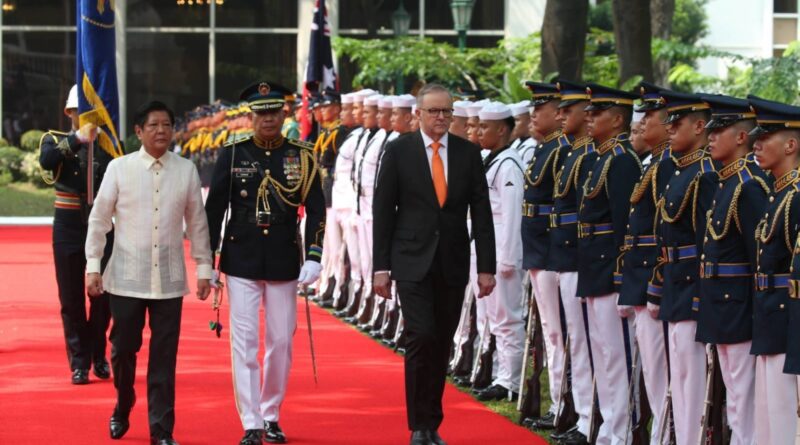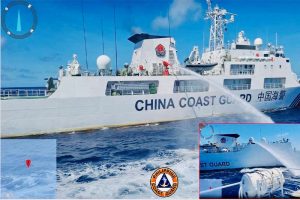Marcos, Albanese sign strategic partnership deal amid South China Sea tensions
(UPDATE) THE Philippines and Australia firmed up their security and economic alliance on Friday with the signing of a strategic partnership, as they sought to counter China’s growing influence in the Asia-Pacific region.
The Joint Declaration on Strategic Partnership was signed following a meeting between President Ferdinand Marcos Jr. and Australian Prime Minister Anthony Albanese in Malaca?ang.
MORE PARTNERSHIPS President Ferdinand Marcos Jr. (right) and Australian Prime Minister Anthony Albanese sign the Joint Declaration on Strategic Partnership between the Philippines and Australia at Malaca?ang on Friday, Sept. 8, 2023. PHOTO BY YUMMIE DINGDING/PPA POOL
Albanese’s visit, which marks the first bilateral talks with an Australian prime minister in Manila in 20 years, follows a series of trips by senior members of his government to the Philippines since Marcos took office in 2022.
Under a strategic partnership, the countries will seek to expand cooperation in several areas, from defense and security to climate change and education.
In remarks after the signing of the declaration and other agreements, Marcos said forming a strategic partnership is “a very, very important development” for the Philippines and Australia.
The signing of the declaration “signals our mutual commitment to deepening collaboration across a spectrum of areas that are vital to both our countries’ growth and prosperity,” the President said.
Albanese said the declaration “is an important symbol of the strength of our relationship and our shared commitment to do more together.”
China’s growing assertiveness on Taiwan and the militarization of artificial islands in the disputed South China Sea have spurred Canberra, as well as Washington, to deepen defense cooperation with longstanding ally Manila.
Marcos thanked Albanese for his “strong support” for the Philippines as it seeks to fend off maritime claims that are “not valid,” in a thinly veiled reference to China.
“To have friends like you and partners like you, especially on that subject, is very gratifying and encourages us to continue down that path,” Marcos told Albanese.
Albanese described the two countries as “great friends” and expressed hope that his visit would help take the relationship “to an even higher level.”
A strategic partnership is the highest level of bilateral ties that Australia has had with the Philippines.
Beijing claims almost the entire South China Sea, ignoring a 2016 international ruling that its stance has no legal basis.
The Philippines, Vietnam, Malaysia and Brunei have overlapping claims to parts of the waterway.
Former president Rodrigo Duterte pivoted away from his country’s traditional security partners toward China, but the Marcos administration has sought to reverse that stance.
Australian and Filipino troops last month held a major joint exercise near the contested waters.
The event was watched by Marcos, Defense Secretary Gilberto “Gibo” Teodoro Jr. and Australian Defense Minister Richard Marles.
At the time, Marcos hailed the drills as “an important aspect of how we prepare for any eventuality.”
The exercises came after a Philippine resupply mission to the Ayungin Shoal in the Spratly Islands was blocked by China Coast Guard vessels using water cannon on August 5, triggering a diplomatic spat and international outrage.
“We have collective responsibility for security, including support for the UN Convention on the Law of the Sea (Unclos), that’s very important,” Albanese told Marcos.
“Australia does support, as I said at the East Asia Summit, the 2016 South China Sea arbitral award. That is final and it’s binding, and it’s important that that be upheld going forward,” he said.
Australia is the Philippines’ second-largest partner in defense and security and one of only two bilateral partners with whom it maintains a status of Visiting Forces Agreement.
It was also the Philippines’ 14th largest trading partner in 2022 and the country’s 11th largest source of total Official Development Assistance, amounting to $180 million as of December last year.
Aside from the strategic partnership, other documents signed Friday include the Memoranda of Understanding on Work and Holiday Visa Arrangement and on National Soil Health Strategy.
Marcos also cited the people-to-people exchanges that have benefited the Filipinos residing and working in Canberra.
“Once again, the Filipino nationals who live in Australia and have chosen to go, live and work there are very happy to have been assimilated properly into Australian society. And for that, we are very grateful,” he said.
Ahead of the talks, Human Rights Watch in Australia called on Albanese to also “seriously” discuss human rights during his talks with Marcos, including pushing for an end to the deadly drug war started by Duterte.
“The Australian government should recognize that it would be a mistake to deepen defense and security ties with the Philippines while ignoring human rights concerns,” Australia director for HRW Daniela Gavshon said.




